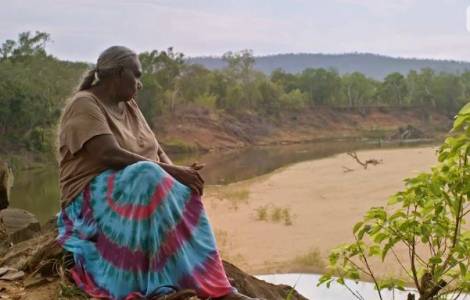
by Paolo Affatato
Sydney (Agenzia Fides) - In the Aboriginal communities in Australia, every assembly, meeting, ecclesial gathering is lived starting from a style of relationship with others which is typical of the Aboriginal culture: the spirit of "Daidirri" (which means "deep listening"). This attitude, which characterizes the relationship with any other person, allows assemblies to proceed fruitfully, is the basis of "walking together" and represents a trait of synodality which has always been lived in these communities.
Specifically, Daidirri comes from the Aboriginal Ngangikurungkurr tribe, who use it to refer to "deep inner listening and silent awareness". Daidirri was first brought to the attention of all Australian church communities by a former Catholic Aborigine from Daly River, Miriam Rose Ungunmerr-Baumann, and has since helped many non-Aboriginal Australian believers to enter into Aboriginal culture and to take advantage of it in their relationship with others.
Miriam Rose adds: "Ngangikurungkurr means 'sounds of deep water'. Ngangikurungkurr is the name of my tribe. The word can be divided into three parts: 'Ngangi' means word or sound; 'Kuri' means water; 'kurr' means deep The name of my people therefore means ‘the sounds of the deep waters’ or ‘the sounds of the depths’. As its name suggests, my people tap into the deep source within us", she explains. "There is another special quality, which is perhaps the greatest gift we can give our fellow Australians. This quality is called Dadirri. It is inner, deep listening and quiet, still awareness. With Dadirri - one recognizes the deep spring that is within us. When I experience dadirri, I am made whole again. I can sit on the riverbank or walk through the trees; even if someone close to me has passed away, I can find my peace in this silent awareness. There is no need of words. A big part of dadirri is listening".
The woman shares some traits of Aboriginal culture: "We are people of the river. We cannot rush the course of the river. We also wait for God's movement. His time is the right time; we know that by placing ourselves in Dadirri's time and spirit, in deep listening, His way and His will will be clear".
"For centuries - she continues - we have listened to the stories told to each other. They are told and sung, over and over again, with the passing of the seasons. Even today, we gather around the fires and listen together the sacred stories. As we grow older, we become the storytellers ourselves. We pass on to the young all they need to know. The stories and the songs are written silently in our minds and we carry them deep within us At ceremonies we celebrate the awareness of the sanctity of our lives. Dadirri's contemplative journey extends throughout our lives. It renews us and brings us peace. It allows us to feel whole again, filled with the Spirit of God".
In the aboriginal way, one learns to listen from the first days of life. "We cannot live a good and useful life if we do not listen. For us, this is the normal way of learning: listening rather than asking questions. We have learned by watching and listening, by waiting and by doing. Our people have been transmitting this way of listening for more than 40,000 years," she reports.
The woman points out that "Daidirri is also about knowing how to wait. Indigenous culture has taught us to sit still and wait. We do not try to hurry things up. We let them follow their natural course, like the seasons. There is no nothing more important than the present. Let us listen and also wait for God to make us understand and for his Word to be a gift for our lives".
As Father Peter Woodruff, Missionary of St Colomban, who lives in Australia, explained, Aboriginal people are in sync with the natural flow of the seasons, with the rhythm of the land, flora and fauna that surround them. In the times of nature, nothing can be rushed or shortened in God's creation: a flower blooms when its time is right, not necessarily when man desires it.
While Western values of productivity and efficiency often dictate what "should" happen in a given time frame (e.g. the meeting should start at 2 p.m. and end at 3 p.m.), Indigenous peoples are able to empathize with what is already happening around them. "In this sense, they are more open to the gift of the now, of the present – and the present is where God dwells. Dadirri teaches them to have a deep inner listening and an awareness of God's spirit in the 'here and now' and, equally important, to be in absolute harmony with Him, with God's times which are not man's times".
Missionary Peter Woodruff concludes: "Many of us have been taught meditation, but Daidirri offers a lineage of deep listening that has been passed down for generations and is an intrinsic part of life"… Besides deep listening to God , "Pope Francis wanted to deepen the tradition of deep listening in Christianity and underlined its importance in the relationships between human beings," she notes. Daidirri is a gift that the Aboriginal people live in their daily lives and which they bring to the universal Church. (Agenzia Fides, 29/7/ 2023)
 EUROPE/RUSSIA - "Night of the Arts 2025": Moscow's Catholic Cathedral opens to thousands of visitors
EUROPE/RUSSIA - "Night of the Arts 2025": Moscow's Catholic Cathedral opens to thousands of visitors